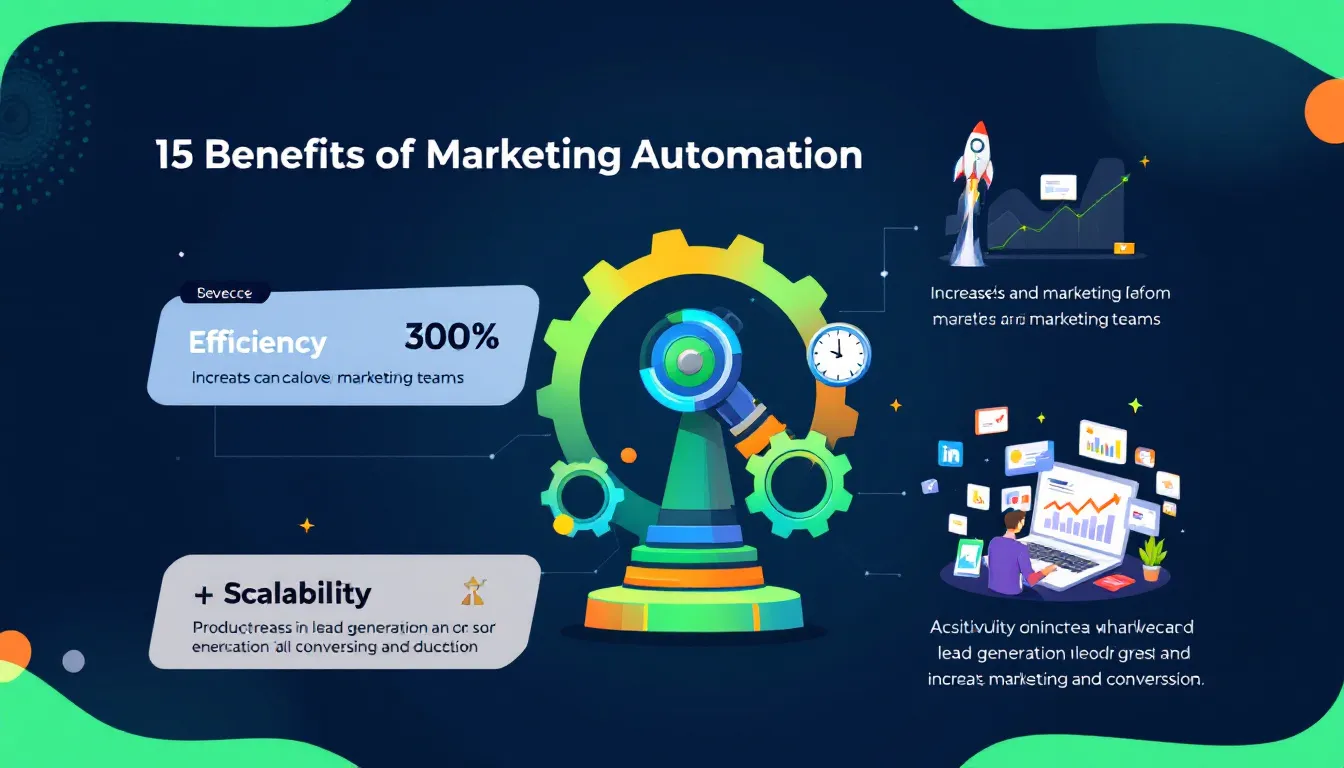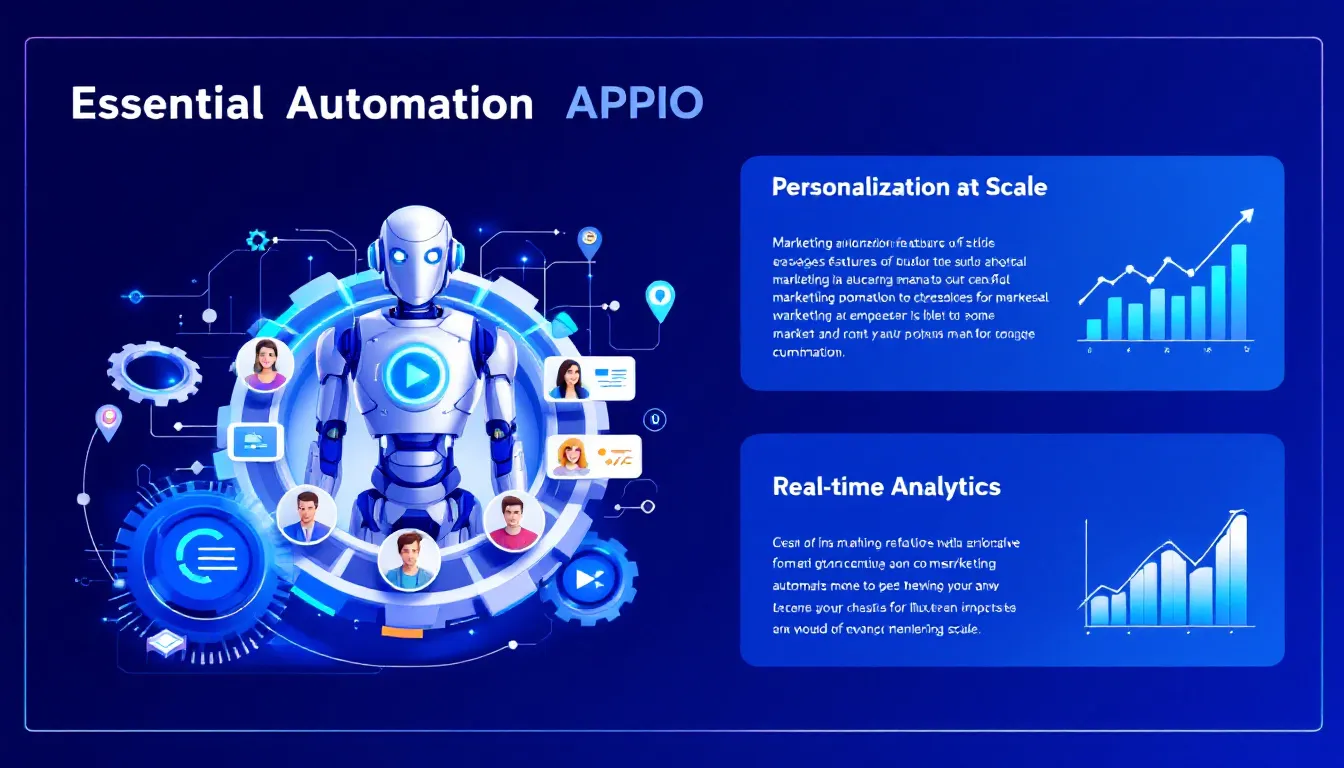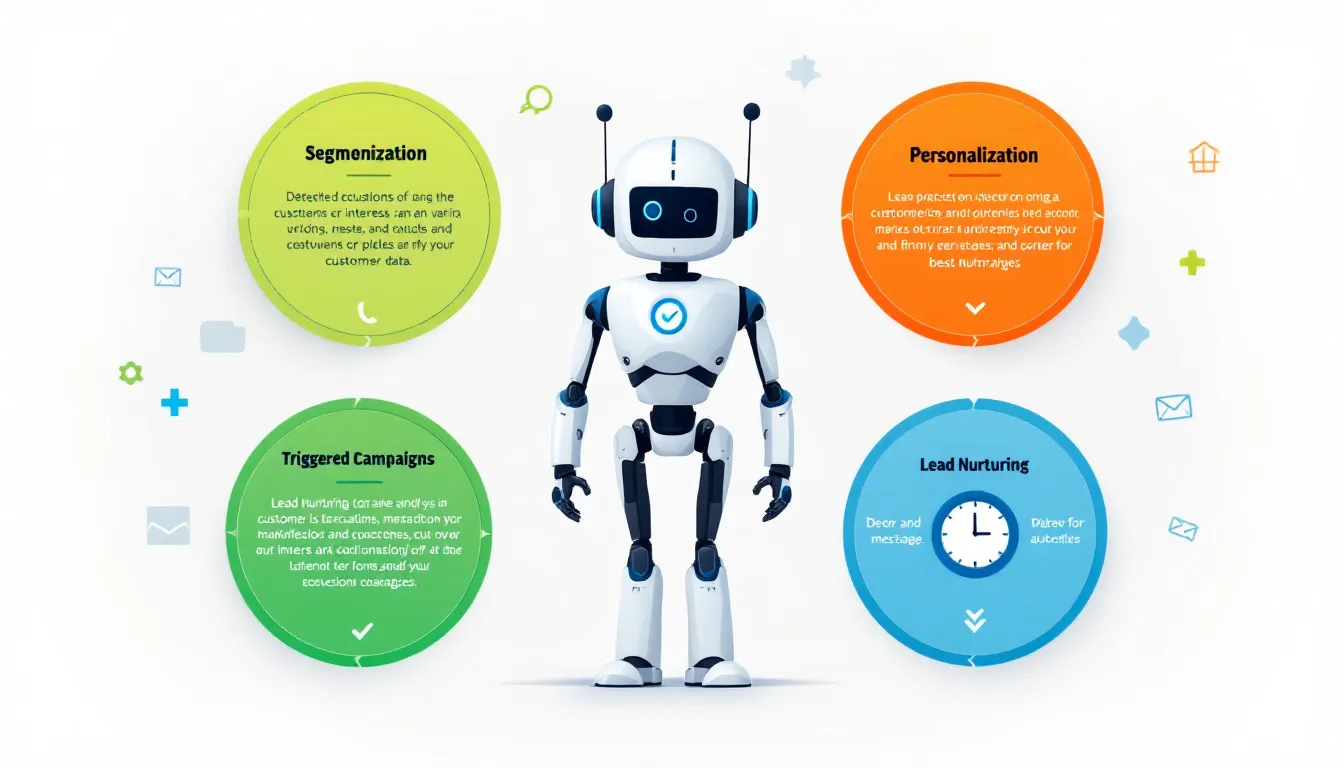10 Top Marketing Automation Tools You Need to Try in 2025
May 18, 2025
Marketing automation streamlines repetitive marketing tasks—like sending emails and managing social media—improving efficiency and personalization. In this article, we’ll explore the top marketing automation tools for 2025 and how they can help your business grow.
Key Takeaways
- Marketing automation enhances efficiency by automating repetitive tasks, allowing teams to focus on strategic marketing initiatives.
- Integration with other business tools and real-time data analysis enable personalized marketing efforts that improve customer engagement and drive conversions.
- Key benefits of marketing automation include increased productivity, cost savings, better lead nurturing through automated workflows, and improved marketing ROI.
Understanding Marketing Automation

Marketing automation is defined as the use of a platform to automate activities across inbound marketing channels. Its main purpose is to automate monotonous marketing work, thereby improving efficiency and personalization. Imagine freeing up your marketing team’s resources from repetitive tasks like sending emails or managing social media, and instead focusing on strategic initiatives that drive growth.
Common uses for marketing automation include email marketing, social media management, and paid ads. These tools handle tasks such as sending emails, managing social media posts, and maintaining contact information, making them indispensable in today’s digital marketing landscape. These automated processes save time and ensure consistency and precision in marketing efforts.
One of the standout advantages of marketing automation is its ability to provide a comprehensive understanding of potential customer behaviors, which aids in delivering tailored content based on buyer personas and behavior. This level of personalization enhances customer communication and strengthens relationships.
Additionally, marketing automation improves efficiency by streamlining workflows, allowing teams to achieve tasks faster and with greater accuracy. Utilizing a single platform to manage various elements of marketing campaigns – from email to social media and ads – further simplifies the process and enhances the overall effectiveness of marketing strategies.
How Marketing Automation Works
Effective marketing automation requires integration with other business tools to streamline marketing efforts. Tools like Zapier can seamlessly connect marketing automation software with other applications, ensuring a cohesive and efficient workflow. This integration empowers marketing teams to harness the full potential of their marketing software, creating a unified approach to managing marketing campaigns across multiple channels.
One of the key features of marketing automation is real-time data analysis. By tracking user behavior and interactions, marketing automation software can tailor marketing efforts to individual user preferences. This level of personalization is achieved through the use of AI marketing tools that adapt messaging and offers based on users’ information. Additionally, automated tools can track interactions such as website visits and email engagement, enhancing the effectiveness of marketing campaigns by providing actionable insights.
Automation triggers play a crucial role in maintaining consistent engagement with customers. For instance, when users download content like brochures or ebooks, their contact details are sent to a customer relationship management platform for further engagement. Follow-up emails are then sent automatically based on previous actions, ensuring timely and relevant communication. This not only keeps customers engaged but also nurtures leads through the sales funnel, ultimately driving conversions.
Benefits of Marketing Automation for Your Business

Marketing automation involves using technology to enhance the efficiency of marketing actions and optimize the sales funnel. By automating repetitive tasks, businesses can increase productivity and achieve better efficiency. Imagine the time saved and the improved focus of your marketing team when mundane tasks are handled by automation tools.
Cost savings, increased efficiency, and enhanced customer experience are some of the significant benefits of marketing automation. Automated processes ensure that marketing campaigns are executed flawlessly, leading to better budget allocation and quicker project delivery. Additionally, by providing a personalized experience, marketing automation helps build customer loyalty and improves customer retention.
One of the most impactful aspects of marketing automation is its ability to prioritize leads through automated lead scoring. This helps businesses identify and focus on high-potential leads, increasing the chances of conversion. Nurtured leads, in particular, tend to make purchases that are significantly larger than those from non-nurtured leads. The ease of nurturing leads with minimal effort ensures that no opportunity is missed, driving business growth.
Marketing automation also plays a crucial role in improving marketing ROI. By providing actionable insights and enabling precise campaign tracking, it ensures that marketing efforts are aligned with business goals. This leads to consistently healthy ROI and enhances customer relationships through targeted and personalized communications.
Essential Features of Marketing Automation Software

Advanced email campaign management tools are a cornerstone of effective marketing automation software. These tools create and automate workflows based on user behavior, ensuring that email marketing campaigns are timely and relevant. Imagine having the ability to send personalized emails to thousands of customers without lifting a finger – that’s the power of automation.
Lead generation tools are another essential feature, focusing on nurturing leads by automating the ‘warm-up’ phase of customer interactions. This ensures that potential customers are engaged and nurtured until they are ready to make a purchase.
Social media campaign management systems also play a vital role, streamlining content creation, scheduling, and performance analysis, thus enhancing social media marketing efforts.
Integration capabilities and robust analytics are crucial for tracking campaign performance and making data-driven decisions. Integrating marketing automation with CRM systems enhances the ability to track customer interests and behaviors, providing valuable insights that drive marketing strategies. Additionally, automated lead assignment features ensure that leads are matched with the appropriate sales representatives, enhancing efficiency and improving conversion rates.
Effective marketing campaign management tools allow businesses to plan, execute, and monitor various campaigns from a single interface. This simplifies the process and ensures that all campaign elements are aligned and working towards the same goal.
Top Marketing Automation Tools for 2025
As we step into 2025, several marketing automation tools stand out for their innovative features and capabilities. These tools cater to businesses of all sizes, offering diverse functionalities and pricing models. Whether you’re a small business owner or part of a large marketing team, there’s a tool designed to meet your needs.
This section will introduce some of the top marketing automation tools for 2025, including HubSpot Marketing Hub, ActiveCampaign, and Mailchimp. Each of these tools brings unique strengths to the table, from comprehensive email marketing automation to advanced CRM integration. We’ll delve into the specifics of these tools in the following subsections, exploring their features, benefits, and pricing models.
Choosing the right marketing automation platform can significantly impact your marketing strategy and overall business growth. By understanding the strengths and capabilities of these tools, you can make an informed decision that aligns with your marketing goals and objectives.
HubSpot Marketing Hub
HubSpot’s Marketing Hub is particularly strong in inbound marketing, integrating CRM with a wide array of marketing features. This seamless integration allows for a unified approach to managing marketing campaigns, ensuring that all customer interactions are tracked and analyzed. HubSpot offers a single platform that manages everything from email marketing to social media management.
One of the standout features of HubSpot Marketing Hub is its workflow builder, which offers a large set of categorized actions for internal and external communication. This allows marketing teams to create complex workflows that automate various tasks, enhancing efficiency and ensuring timely engagement with prospects. Additionally, HubSpot provides custom reports and insights into dashboards, enabling effective tracking and analysis of marketing efforts.
HubSpot’s extensive marketing features and CRM integration make it a comprehensive solution for businesses looking to streamline their marketing processes and enhance customer experience. HubSpot’s capabilities allow marketing teams to nurture prospects, create personalized experiences, and drive business growth.
ActiveCampaign
ActiveCampaign focuses on various marketing strategies. These include:
- Email marketing
- SMS marketing
- Social marketing
- Targeting advertising audiences
Its robust CRM capabilities and advanced email marketing automation make it a powerful tool for businesses aiming for growth. ActiveCampaign enables you to reach your target audience through multiple channels with personalized messages.
One of the key benefits of ActiveCampaign is its comprehensive AI capabilities, which enhance its marketing automation. The platform supports integration with Zapier, allowing seamless connections with other apps and ensuring a cohesive marketing strategy. However, it’s worth noting that its predictive AI sending feature is limited to the two highest pricing tiers, which may be a consideration for some businesses.
ActiveCampaign offers pricing tiers starting at $15 per month, making it accessible for businesses of various sizes.
Additionally, it supports workflow automation in multiple languages, including:
- Portuguese
- French
- Italian
- German
- Spanish
This makes it a versatile tool for global marketing efforts.
Mailchimp
Mailchimp is renowned for its email marketing automation, offering a full suite of automation tools that cater to businesses of all sizes. Its strengths lie in its perfected email strategy and the ability to integrate with third-party apps, ensuring seamless email automation. Imagine having a platform that not only automates your email campaigns but also integrates with your existing tools – that’s Mailchimp.
One of the major benefits of Mailchimp’s automation features is its integration with other apps for email automation. This allows businesses to streamline their marketing processes and ensure that all elements of their marketing strategy are working together harmoniously. Additionally, Mailchimp offers a free version, making it an excellent choice for small businesses and startups.
Mailchimp’s comprehensive suite of automation tools and its focus on email marketing make it a popular choice among users. Mailchimp’s capabilities help businesses create effective email campaigns, optimize marketing efforts, and drive growth.
Leveraging AI in Marketing Automation

Artificial intelligence has revolutionized the marketing landscape, providing powerful tools to enhance personalization and optimize marketing activities. AI-powered marketing tools like Optimove enable companies to segment users based on real-time data, ensuring that marketing messages are always relevant and timely. Imagine having the ability to adapt your marketing strategies in real-time based on audience feedback – that’s the promise of AI in marketing automation.
AI technologies can create hyper-personalized content and recommendations, adapting quickly to changes in consumer behavior. This level of personalization not only enhances customer engagement but also drives conversions by delivering the right message at the right time. Additionally, AI-driven marketing automation facilitates the analysis of large datasets, providing predictive insights about customer behavior and helping marketers make informed decisions.
Real-time performance analytics and insights provided by AI tools allow marketers to optimize their campaigns effectively. AI enhances the efficiency and effectiveness of marketing strategies by automating and optimizing time-consuming tasks. The impact of AI on marketing is profound, reshaping the industry by enhancing analytics, content creation, and customer care.
Implementing Marketing Automation in Your Strategy
Implementing marketing automation starts with establishing clear goals that align with your business objectives. Defining what you want to achieve with marketing automation ensures that your efforts are focused and measurable. Developing detailed customer profiles is also crucial, as it allows you to tailor your automated marketing efforts to meet the specific needs of your audience.
Mapping the customer journey helps identify crucial touchpoints for automating interactions. Understanding the different stages of the customer journey enables the creation of automated workflows that enhance the overall customer experience. Creating engaging content is vital for automated campaigns, as it ensures that your messages resonate with the audience and drive conversions.
Designing efficient workflows that handle repetitive tasks while ensuring timely engagement with customers is key to effective marketing automation. Regular performance analysis and testing are necessary to refine your automation strategies and improve marketing effectiveness.
Scaling your marketing automation efforts involves leveraging insights to expand your reach without significantly increasing costs. Avoiding common issues such as insufficient training and lack of a strategic plan will ensure a smooth implementation process.
Best Practices for Effective Marketing Automation

A/B testing is a powerful tool for enhancing marketing outcomes. By adjusting messages automatically based on audience responses, A/B testing allows marketers to fine-tune their campaigns for maximum effectiveness. The benefits of automating A/B testing include time savings, real-time data access, and the ability to make quick adjustments based on performance.
Utilizing intent data allows marketers to tailor campaigns to the specific interests of target audiences, creating a more engaging experience. Creating personalized customer journeys enhances engagement by addressing the different needs of stakeholders within buying committees. Dynamic nurture programs adapt to lead behaviors, ensuring timely and relevant interactions that maintain prospect engagement.
Setting clear key performance indicators (KPIs) is crucial for measuring the success of marketing automation efforts. Continuous monitoring allows marketers to assess what’s working, identify areas for improvement, and understand the impact on key metrics. Repurposing high-performing content helps maintain a consistent message across various platforms while maximizing resources.
Real-World Examples of Successful Marketing Automation
Real-world examples demonstrate the power of marketing automation tools and strategies to boost brand awareness and accelerate growth. For instance, Airbnb’s commitment to emerging technologies, including marketing automation, has significantly contributed to their growth. Imagine the impact of automating complex marketing processes and freeing up your team to focus on creative and strategic initiatives.
BuzzFeed effectively uses marketing automation for scheduling social media communications and optimizing paid ads. This approach has resulted in a 9% growth in programmatic ad revenue to $17.3 million. Similarly, Netflix utilizes marketing automation to create customized landing pages based on audience preferences and behaviors. This strategy influences around 80% of user viewing patterns through its recommendation system.
Harley Davidson experienced a remarkable 2,930% increase in leads per month through the use of Albert.ai for marketing automation. These successful implementations across diverse companies highlight the significant impact of marketing automation on growth and customer engagement.
Overcoming Common Challenges in Marketing Automation
One of the common challenges in marketing automation is the skills gap, with 36% of respondents identifying a lack of expertise in martech and marketing automation. Proper training is essential to ensure that your marketing team can effectively use marketing automation tools and platforms.
Poor data quality can severely limit the effectiveness of marketing automation efforts. Inaccurate data leads to misguided decisions and ineffective campaigns. Ensuring data accuracy and reliability is crucial for the success of your marketing automation strategy.
Excessive reliance on automation can also result in generic communication that fails to resonate with customers’ individual needs. Balancing automation with personalized communication is key to maintaining customer engagement.
Regularly monitoring and optimizing automated campaigns is crucial to adapt to evolving customer preferences and maintain efficiency. Visitor tracking tools provide insights into user behavior, which is essential for continuous website improvement and effective marketing strategies.
Addressing these challenges helps businesses overcome obstacles and maximize the benefits of marketing automation.
Summary
In summary, marketing automation offers a myriad of benefits, from increased productivity and cost savings to enhanced customer experience and improved marketing ROI. By leveraging advanced features such as email campaign management, lead generation, and social media campaign management, businesses can streamline their marketing efforts and drive growth.
The integration of AI in marketing automation further enhances personalization and optimization, providing real-time insights and predictive analytics that inform marketing strategies. By implementing best practices such as A/B testing, utilizing intent data, and setting clear KPIs, businesses can maximize the effectiveness of their marketing automation efforts.
As we move forward in 2025, the importance of marketing automation cannot be overstated. By adopting these tools and strategies, businesses can stay ahead of the curve, enhance customer engagement, and drive sustainable growth. The future of marketing is automated, and the time to embrace it is now.
Frequently Asked Questions
What is marketing automation?
Marketing automation is the use of a platform to streamline and automate marketing activities across various channels, including email, social media, and paid advertising. This can enhance efficiency and effectiveness in reaching your target audience.
How does marketing automation benefit my business?
Marketing automation significantly boosts productivity and efficiency while reducing costs and enhancing customer experience by automating repetitive tasks and delivering personalized communications. Implementing such tools can transform your marketing efforts and drive better results for your business.
What are essential features to look for in marketing automation software?
When selecting marketing automation software, prioritize advanced email campaign management, lead generation tools, integration capabilities, and robust analytics. These features will significantly enhance your marketing efforts and streamline your processes.
How can AI enhance marketing automation?
AI enhances marketing automation by delivering real-time data analysis and hyper-personalized content, which improves efficiency and effectiveness while automating time-consuming tasks. This results in more targeted marketing efforts and better engagement with customers.
What are some common challenges in marketing automation and how can they be overcome?
Marketing automation often faces challenges like skills gaps, poor data quality, and over-reliance on automated processes. These issues can be addressed through comprehensive training, data accuracy maintenance, striking a balance between automation and personalization, and consistent campaign monitoring and optimization.
Want To Make AI Work For Your Business?
Whether you need training, coaching, consultancy, or hands-on implementation, we can help you integrate AI into your marketing strategy—without the jargon or overwhelm.
Get in touch, and we’ll help you find the perfect solution!

